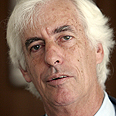
Austria election results raise concern
As extreme right-wing parties celebrate massive gains in general elections, one of questions raised is how will world respond
Professor Moshe Zimmerman, the head of the German Studies department at the Hebrew University, was not at all surprised. "The main reason was due to the lack of success of the national unity government. All the parties fought with each other, and the Austrian public voted for the alternative," he said.
Even though the Austrian public went with the alternative, they ignored the moderate option and decided to go to the Right.
"The voters ignored the green party, and went to the Right, and the explanation for this is no surprise. We know the power of the Austrian right wing parties: the Austrians themselves tend to swallow the successes of the right-wing parties than the green party.
"The Right expresses suspicion towards the European Union and is suspicious of both globalization and foreigners. These are things that they can sell to the voting public, and that's why they are successful," explains Zimmerman.

Right-wing supporters celebrate the results (Photo: Reuters)
While the Western world may view these parties as extreme right wing, the Austrians themselves don't necessarily view them as radicals.
"In Austria, in the conditions after the collapse of the Berlin wall, the public is inclined more towards the right than the left, and they don't necessarily view it as extreme right-wing. There are more extreme elements than others, but they think that they are voting for a legitimate political party who understands the dangers of globalization and will fight the criminal elements that originate from Eastern Europe, those are the platforms they use," adds Zimmerman.
The burning question is how the international community will respond to Right wing elements gaining strength in Austria; Zimmerman adds that "this is a slap in the face for the EU. This means another country that will not happily approve the EU treaty. Jewish and anti fascist groups will protest, but a boycott like after the last elections will not happen, Heinz-Christian Strache is not Jorg Haider, he learned how to talk."
Israel might express its opinion on the matter but Zimmerman hopes that this time the reaction will be less extreme than last time, when Israel recalled it's ambassador from Vienna.
'Who knows what the future will bring'
The star of these elections is Heinz-Christian Strache, chairman of the Freedom Party of Austria (FPO). A former dental technician, he took over the role of chairman when Jorg Haider, left the FPO to establish the Alliance for the Future of Austria (BZO). Strache however is not planning on making the same mistakes that hurt Haider in the 2000 elections.According to Prof. Zimmerman, "Strache can be categorized as the radical right, but he knows that he doesn't need to say out loud things that could be regarded as racist and anti Semitic. He learnt his lesson from Haider and he knows the boundaries, he uses slogans: he takes care of the middle class and the country while fighting crime, and behind that rhetoric he is fighting minorities, foreigners and society's weak."
Zimmerman comments that the process of building a government will be long and complicated. This being to the declaration made by Social Democratic Party of Austria (SPO), that no matter what the results will be, a coalition with the right wing parties is out of the question.
Zimmerman adds "who knows what the future will bring. The SPO needs to build a coalition, which will take time. The animosity between Haider and Strache is too great to create a tempting alternative. Haider might even offer the SPO to stay with them, or he might align himself with either the green party or with another right-wing party.
"The most probable thing is that the process will take a few days. Right now there is the option of the SPO to join with the FPO and the BZO, but that sort of government will be unstable. A government that is based on the two right wing parties is also a possibility, though highly unlikely."










